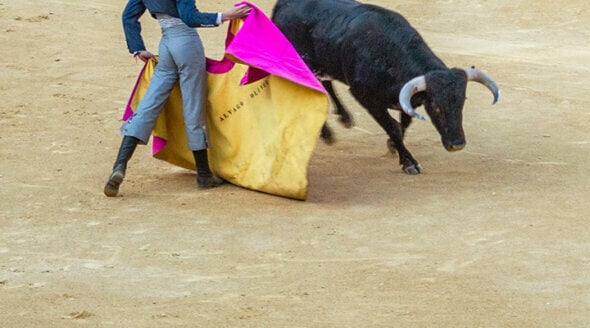Animals Raised to Produce Milk

Cows are gentle, intelligent animals, who, when given the chance, will nurture their young and form lifelong friendships with one another. But on dairy farms, cows are intensively confined and lead desperately unhappy lives, while the humans who drink their milk have an increased risk of developing heart disease, diabetes, cancer, and many other ailments.
Abuse on Farms
Treated as milk-producing machines, cows on dairy farms are selectively bred to produce unnaturally high volumes of milk. Their calves are taken away from them within 36 hours, causing grief and anguish to both mother and calf. Mother cows often bellow and call out frantically for their young for several days afterward.
Cows raised to produce milk may spend their entire lives standing on concrete floors. They are fed unnatural, high-protein diets – which include dead chickens, pigs, and other animals – to make them produce a higher yield of milk. A British cow today typically produces 4.5 times more milk than she would need to feed her calf. As a result, these cows frequently suffer from painful udder inflammation, or mastitis, which leads to higher levels of pus and bacteria in their milk.
The strain of continual pregnancy exhausts cows and often leaves them lame. When they are worn out and can no longer produce such high volumes of milk, they are sent to the abattoir and killed.
Goats and Sheep
 Cows aren’t the only victims of the dairy industry: other animals reared for their milk endure the same shocking lack of welfare and, after a few years of abuse, the same violent death in an industrial abattoir.
Cows aren’t the only victims of the dairy industry: other animals reared for their milk endure the same shocking lack of welfare and, after a few years of abuse, the same violent death in an industrial abattoir.
Intelligent, inquisitive goats, who are known to be patient, nurturing mothers, and gentle sheep are also impregnated over and over again and have their young traumatically torn from their side within hours of giving birth. Because there is little market for goat meat, male kids are usually killed as soon as they’re born. In the UK, there is a growing trend towards intensive, zero-grazing goat farms, on which animals are imprisoned for their entire lives and hooked up to milking machines. As with cows, constant milking leaves sheep and goats prone to sore, infected udders and other illnesses.
Milk and Human Health
As if the unnecessary suffering of the UK’s 1.8 million dairy cows weren’t bad enough, milk is bad for our health, too. Cow’s milk is suited to the nutritional needs of calves, who have four stomachs and gain hundreds of pounds in a matter of months, sometimes weighing more than 1,000 pounds before they are 2 years old. For humans, milk is high in fat, a common trigger for allergies, and linked to many illnesses. For example, medical studies indicate that milk may actually increase women’s risk of having osteoporosis.
What You Can Do
Fortunately, it’s possible to get all the nutrients you need without hurting cows. Fortified plant-derived milks, such as soya or almond milk, provide calcium, vitamins, iron, zinc and protein but do not contain any cholesterol. Even better, they’re also cruelty-free!

FACTBOX
- A cow’s natural lifespan is around 25 years, but most cows on dairy farms are slaughtered when they’re only 5 or 6.
- Drinking milk supports the cruel veal industry. Male calves born to dairy cows frequently end up being raised for veal.
- Humans are the only species to drink milk beyond infancy or to drink the milk of another animal.
- Dairy farming has a huge impact on the environment and accounts for 4 per cent of the world’s total greenhouse gas emissions.
- Most dairy cows would naturally grow horns, but farmers remove the horn tissue using searing-hot irons, caustic chemicals, blades, or hand saws – often without any anaesthetics.

